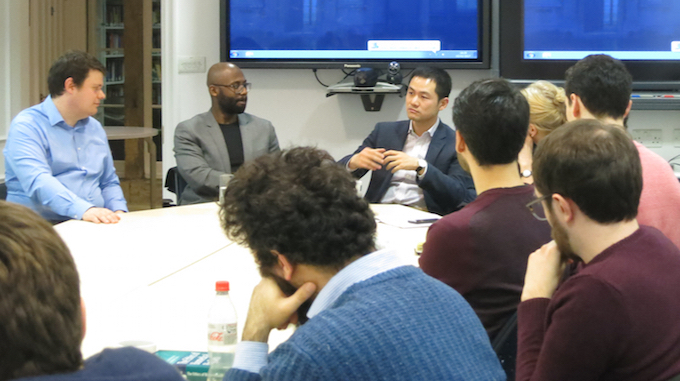
David Sutcliffe
Senior Science Writer
David provides advice and editorial services to the OII faculty, and writes commissioned content for our publications.
Employers recognize the value of a degree from the University of Oxford, and our graduates secure excellent positions in industry, government, NGOs, or go on to pursue doctoral studies at top universities. In order to give a sense of the many things you can do with a degree from the OII, we regularly invite alumni to come back to discuss their career paths with our current MSc students. Our most recent careers panel was facilitating by DPhil Course Director Gina Neff, and included the following MSc alumni:
Vincent Ni (MSc 2010). Vincent ended up as a journalist, initially with an investigative business magazine Caixin as a foreign correspondent, which took him to to Egypt in 2011 to report on the political upheaval. He has now been at the BBC World Service for three years, recently covered the US election.
Cohen Simpson (MSc 2012). Even as he was doing the OII MSc, Cohen knew he wanted to do a doctorate. He is now a sociology postdoc at Cambridge University (via a PhD at the LSE).
Justin Kempley (MSc 2014). At the OII he specialised in public health policy. Describing the OII MSc as a “fantastic experience”, he is currently part of the public affairs team at the mobile company Three.

Justin Kempley, Cohen Simpson and Vincent Ni discussing their career paths with our current MSc students.
The introductions over, Gina led some discussion around all the things our masters students would be keen to hear about from our former students as they transitioned from their OII masters to their careers in the real world. For example — what could our MSc students be doing now to help them later when applying for jobs?
One recommendation was to apply for as many jobs as possible, and to go to careers fairs — almost as a way to discover yourself. “Listen to your interviewers, and don’t be offended by feedback — even if they suggest you should be pursuing a different direction.” In Vincent’s case it looked like one of his interviewers was probably right — he went into journalism, and hasn’t looked back.
Being entrepreneurial and creative in your approach is also essential: you should leverage both your thesis topic and the networks you build during your time at the OII (or in Justin’s case, built through his work with a charity). Contacts are important!
And of course the OII MSc is itself a big asset — a foot in the door. The degree itself will be a good conversation starter — interviewers will either already have heard of the OII (“and its good reputation”), or if not, will be interested in finding out what an MSc in Social Science of the Internet actually involves (of which more below..). They said that the OII MSc will make you stand out — but you must make an asset of it.
All three alumni were clear that the OII experience provides an excellent starting point to a career, and a good talking point in job interviews. You’ll certainly be able to use things you’ve learned and discussed with your supervisor and explored in your thesis to answer questions. Vincent noted that journalism is all about finding and presenting stories: and that his knowledge of digital tools to present stories with impact (and the changing role of technology in the news room) certainly laid the foundations for his career.
And a final note from Cohen — PUBLISH! Make sure to publish your dissertation, particularly if you want to go into academia.
For the second half of the session, Gina opened up the conversation to questions from our current masters students. And the first question was certainly a great one. Thinking themselves back to their interviews — how would the three alumni describe (and sell) the OII’s MSc in Social Science of the Internet to a potential employer?
Cue wry smiles, and a short pause as they remembered their interviews.
The answers clustered around three main points:
1. The degree provides a translation function. In an interview you’ll need a narrative about where tech is, and how it is embedded in everyday life. After all, increased embeddedness is the direction of travel — having studied the OII MSc, you’ll have the skills and knowledge to understand new technologies as they arrive.
2. You’ll also come out with a good understanding of how technology affects social life — and the effect on society of technology as a whole, not just the internet. This relates to the previous point: you’ll have a knowledge of fundamental principles, not just specific applications (which are of course changing all the time — mobile internet certainly wasn’t ubiquitous when the MSc programme was first launched).
3. You should emphasise your methodological expertise and ability to “work with data” — sell yourself as a methodological expert. But don’t be blind to theory: the combination of data and theory is a real strength.
The conversation continued to circle around these themes. Someone asked how easy is it to change academic focus later, perhaps from a foreign-policy to a domestic-policy focus — a question relating to the (perhaps) fear of specialising too early in one’s degree. All three alums seemed confident on this point. They pointed to the OII’s unique strength, i.e. its multidisciplinarity — and the consequent richness of the degree — as allowing you to do just that. “The OII will put you in a brokerage position between disciplines.” But they emphasised that YOU have to make that argument in interview.
In first introducing himself, Justin had mentioned that his last meeting was with the National Farmers Union about the digital divide, and what it means to both individuals and communities. That intersection between academia and policy relates to this “brokerage” or translation role — for example, putting things into language that MPs can understand, to inform policy making. He mentioned that the OII MSc was an attractive degree — he didn’t feel tied into a particular path, and he has the skills and information to take his career in a different direction should he want to.
One of the speakers noted that their undergraduate degree was “pretty useless” — because (being narrowly focused on a single discipline) it didn’t teach him about all the OTHER things he was dealing with in his career. But when the OII teaches you about (for example) policy, you’ll be able to understand the language people use, and it will help you understand the industry as a whole (no matter what particular disciplinary area you have ended up in). The wonderful thing about any perceived ambiguity in the degree, they said, is that you can make it what you want it to be — whatever it is the interviewers want, that can be YOU.
So they said that while students will inevitably specialise during the course, this should not present a problem — and there will be opportunities to surprise yourself. After all, interviewers will want to know what you are capable of doing — not just the degree itself: “So bring yourself to life!” Another of the speakers noted that their undergraduate degree was also very single discipline-focused (unlike the masters), but that the OII MSc ended up opening up far more doors for him than it closed.
On the specific point of how to translate the OII MSc into a PhD thesis in sociology (i.e. into a specific single discipline — a follow-up question from the floor), Cohen mentioned that he is “still learning” how to do that, but that you should choose traditional old-school sociology topics and methods and marry that to a love of new technology: “here we are again: translating.”
It seems it’s all about the translating.
On the question of what they did during their time at the OII that was helpful to their careers (or what they would do differently), Vincent mentioned that he had been very closely involved with the Reuters Institute for the Study of Journalism — which relates closely to what he’s doing now (indeed he gave a talk there recently). Meeting all the veteran journalist Fellows informally helped in lots of unpredictable and randomly useful ways.
Cohen said he spent a lot of time in the library, but that it’s OK — you can “just slow down” and have a bit of fun too. He said you shouldn’t underestimate reading groups (like the Nuffield reading group / network): building those networks is important if you want to stay in academia. Justin mentioned that it’s rare to have such a large group of interesting people all in one place — the Oxford community is something he misses, and something that’s definitely worth taking advantage of.
This led to discussion about the cohort, and also cohort effects — how did their cohort help them end up where they are now?
Cohen mentioned that if you build a social network during your time at the OII, you’ll be able to draw on it later, and continue to draw on that intellectual exchange. Justin valued the informal peer-review of essays that took place between the students on the course — particularly when people had different backgrounds (law, economics, politics etc.) and approaches, as well as different nationalities, ages, and backgrounds. The OII student body is pretty varied. And these different perspectives are useful, particularly when you’re asked questions about things you didn’t — but perhaps should have — thought of. He recommended that our students draw on all that different experience, and ask questions: “It’s a support network — use it.”
And Vincent mentioned again that things can be very random, and that it’s difficult or impossible to predict where you’ll end up. But “you have such an interesting cohort — everyone has an interesting story to tell — you’ll know your fellow students very well, and everyone is very happy to support each other.” There are lots of OII alumni all over the world, and certainly many working in London (for Google etc.). The network of his cohort is very robust, and he’s received a huge amount of help from fellow alumni, particularly when starting out as a journalist in Egypt. And being an intellectual bunch you’ll “learn something from them whenever you meet for alumni drinks.”
Gina laughed at this point — jumping on the idea of a *cross-cohort* effect — of all the new connections being built between year groups at next week’s alumni drinks in London: “That will be when the OII takes over the world, for good — not evil!“
And laughing aside, and speaking purely personally, as someone who has seen every cohort of OII students pass through our doors, from our very first intake of doctoral students in 2006 and masters students in 2009 — and knowing what a lovely, thoughtful and bright bunch of alumni we have accumulated, I think I would be really quite happy with that..
David Sutcliffe (Comms Manager, OII)